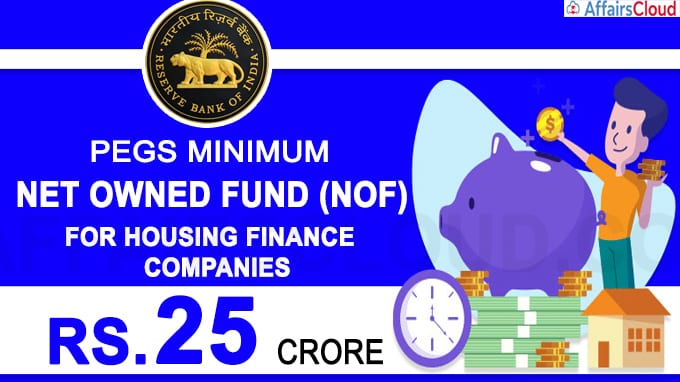 In August, 2019, the government has exercised the Finance (No.2) Act, 2019 (23 of 2019) for amending the National Housing Bank Act, 1987 resulting in transfer of regulation of housing finance companies (HFCs) to Reserve Bank of India (RBI) from the National Housing Bank (NHB). After this, Part VII of Chapter VI of the Finance (No.2) Act, 2019 (23 of 2019 came into effect, stating an issue of revised regulations. In this regard, on June 17, 2020, RBI being a new regulator has proposed changes to be prescribed for HFCs with an aim to increase their efficiency and address concerns of liquidity and double financing. Click Here to Read
In August, 2019, the government has exercised the Finance (No.2) Act, 2019 (23 of 2019) for amending the National Housing Bank Act, 1987 resulting in transfer of regulation of housing finance companies (HFCs) to Reserve Bank of India (RBI) from the National Housing Bank (NHB). After this, Part VII of Chapter VI of the Finance (No.2) Act, 2019 (23 of 2019 came into effect, stating an issue of revised regulations. In this regard, on June 17, 2020, RBI being a new regulator has proposed changes to be prescribed for HFCs with an aim to increase their efficiency and address concerns of liquidity and double financing. Click Here to Read
- In that, RBI proposed to increase the minimum net owned funds (NOF) for HFCs from the current requirement of Rs10 crore to Rs 20 crore in order to strengthen their capital base.
- Now on October 22, 2020, RBI issued the revised regulatory framework for HFCs under which the minimum NOF size for HFCs is fixed at Rs 25 crore.
- It should be noted that the corresponding provisions of section 29B and 29C of the NHB Act, 1987 will be applicable to HFCs.
Key Points:
–As per the revised framework, the HFCs holding a Certificate of Registration (CoR) and having an NOF of less than Rs 25 crore will be required to achieve NOF of Rs 15 crore by March 31, 2022 and Rs 25 crore by March 31, 2023.
–Also HFCs will not impose foreclosure charges/pre-payment penalties on any floating rate term loan sanctioned for purposes other than business to individual borrowers.
–HFCs lending against the collateral of listed shares are required to maintain a Loan to Value (LTV) ratio of 50% for loans granted against the collateral of shares.
–HFCs will also be required to maintain a LTV ratio not exceeding 75% for loans granted against the collateral of gold jewellery.
–It has been decided to additionally exempt HFCs from section 45-IB (Maintenance of percentage of assets) and section 45-IC (Reserve fund) of the RBI Act, 1934.
RBI issues guidelines for self-regulatory organisation for payment system operators:
On the lines of the announcement made in the Statement on Developmental and Regulatory policies issued as part of the Monetary Policy statement dated February 6, 2020, the Reserve Bank of India (RBI) released a draft framework for grant of recognition to an industry association as a Self-Regulatory Organisation (SRO) for Payment System Operators (PSOs) on August 18, 2020. Read RBI Released Draft Framework for Self-Regulatory Body for Payment System Operators
- Now on October 22, 2020, RBI finalized these guidelines to set up SRO for PSOs under Companies Act, 2013 as a not for profit body and non-governmental organisation will serve as a watchdog to guard against unprofessional practices within an industry or profession.
- This directive is issued under Section 18 read with Section 10(2) of the Payment and Settlement Systems Act, 2007 (Act 51 of 2007).
Key Points:
–Interested groups/association of PSOs (banks as well as non-banks) seeking recognition as SRO may apply to the chief general manager, department of payment and settlement systems at the RBI,
–SRO will frame rules for system security, pricing practices, customer protection measures, grievance redressal mechanisms, among others, and is expected to resolve the disputes among the members internally through mutually accepted processes to ensure that members operate in a disciplined environment and even accept its penal actions.
–At least one-third of the members on the board of directors of the SRO shall be independent and not associated with member institutions.
Reserve Bank bars payment system operators from launching new QR codes
The “Report of the committee for Analysis of QR (Quick Response) Code” under the chairmanship of Prof Deepak B. Phatak was publicized by RBI on July 22, 2020 for suggestions. Read RBI Released Report of Committee for Analysis of QR Code
Now, on the lines of its recommendations of the report and suggestions received, RBI has took the following key decisions which were issued under Section 10 (2) read with Section 18 of the Payment and Settlement Systems Act, 2007 (Act 51 of 2007):
- The two interoperable QR codes in existence – Unified Payments Interface (UPI) QR and Bharat QR will continue as at present.
- PSOs that use proprietary QR codes can add one or more interoperable QR codes by March 31, 2022.
- No new proprietary QR codes shall henceforth be launched by any PSO for any payment transaction.
- RBI will continue a consultative process to standardize and improve interoperable QR codes.
Recent Related News:
i.On July 09, 2020, According to data from the Reserve Bank of India (RBI), Tamil Nadu (TN) has topped market borrowings among States in India with a collection of Rs. 30,500 crores in the fiscal 2020-21(FY 21).
ii.On August 12, 2020, RBI mandated the urban co-operative banks (UCBs) with assets of Rs 2,000 crore or above as on March 31, 2020 to implement system-based asset classification from 30 June 2021.
About Reserve Bank of India (RBI):
Headquarters– Mumbai, Maharashtra
Formation– 1 April 1935
Governor– Shaktikanta Das
Deputy Governors– 4 (Bibhu Prasad Kanungo, Mahesh Kumar Jain, Michael Debabrata Patra, and M Rajeswar Rao)




